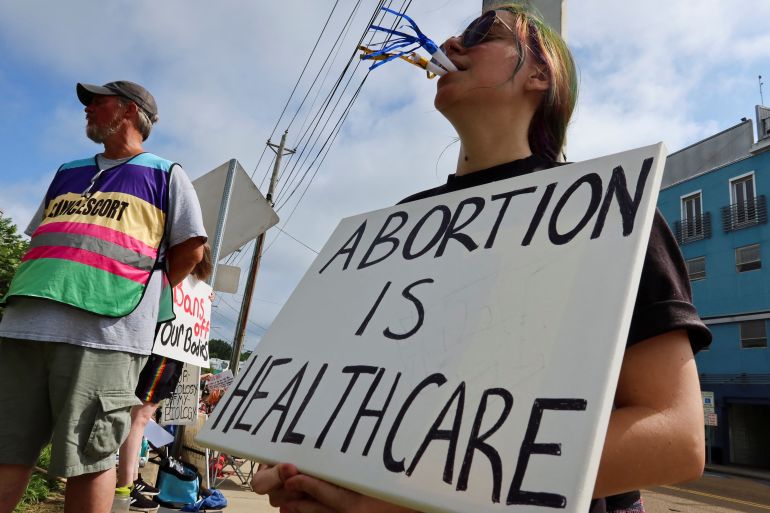US Justice Department sues Idaho over abortion ban
The DOJ announced the lawsuit on Tuesday, saying the state’s ban would prevent doctors from providing medical treatment.

The United States Department of Justice (DOJ) has sued Idaho over the state’s near-total ban on abortion, saying the stringent ban denies pregnant women potentially life-saving medical care, and therefore “directly conflicts” with federal law.
The DOJ announced the lawsuit on Tuesday and claimed in a press release that the federal Emergency Medical Treatment and Labor Act (EMTALA) takes priority over Idaho’s abortion ban in cases where abortion could help stabilise an emergency medical condition. The EMTALA requires hospitals that receive federal funds to provide people with “necessary stabilising treatments” during a medical emergency.
Keep reading
list of 3 itemsGeorgia patients sent home after abortion ban comes into effect
Omar, AOC among US lawmakers held at pro-abortion rights rally
“We will use every tool at our disposal to ensure that pregnant women get the emergency medical treatment to which they are entitled under federal law,” said Attorney General Merrick Garland in a statement. “And we will closely scrutinize state abortion laws to ensure that they comply with federal law.”
The lawsuit is the latest part of an ongoing and contentious battle to shape the legal and political landscape around abortion rights in the United States. In June, the US Supreme Court overturned Roe v Wade, the 1973 decision that had previously guaranteed the constitutional right to an abortion.
After the decision, a number of Republican states moved swiftly to impose new restrictions and outright bans, and pro-abortion rights groups have contested those laws in court.
With the legal landscape still adjusting, some medical professionals now operate in a state of uncertainty. That has resulted in ambiguity over whether abortion is still permissible in certain medical circumstances where it can help preserve the wellbeing of the mother.
Like many bans promoted by anti-abortion rights groups, the law targets doctors who provide abortions and those who facilitate the procedure. Under the Idaho law, anyone who carries out an abortion is subject to felony charges that can result in up to five years in prison.
Garland has said that it would “make it a criminal offence for doctors to provide the emergency medical treatment that federal law requires”.
The DOJ stated that the state’s ban would force doctors to violate federal law by refusing to provide “necessary stabilizing treatment”. “When a physician reasonably determines that the necessary stabilizing treatment is an abortion, state law cannot prohibit the provision of that care,” the DOJ statement said.
Idaho’s Republican Governor Brad Little said in a statement on Tuesday that the state would “vigorously uphold state sovereignty” against what he described as “federal meddling”.
“The US Justice Department’s interference with Idaho’s pro-life law is another example of Biden overreaching yet again,” the statement said.
— Brad Little (@GovernorLittle) August 2, 2022
In the aftermath of the Supreme Court’s decision to overturn Roe, a flurry of lawsuits, bans, and court decisions have created dizzying confusion over the state of abortion access across the country.
According to the pro-abortion rights Guttmacher Institute, 13 US states have “trigger bans” that immediately came into effect following the overturn of Roe, or will soon take effect. Idaho is one of the states with a trigger ban, but it has also passed additional anti-abortion legislation.
One such 2022 law, which is facing a separate challenge in court, allows potential ‘relatives’ to sue medical providers who perform an abortion. While rapists would not be allowed to utilise that provision of the law, their family members would be, according to the Associated Press news agency.
In early July, US President Joe Biden signed an executive order with several steps to help protect access to abortion and contraception. The leadership of the Democratic Party has been criticised by pro-abortion rights groups and its own progressive wing for failing to act with sufficient urgency as the Republican Party wages a full-scale assault on abortion rights.
Others worry that with abortion struck down, other social rights long considered settled could also come under threat.
When the Supreme Court handed down its decision reversing Roe, conservative Supreme Court Justice Clarence Thomas noted that other decisions that relied on similar legal arguments could be revisited.
His examples included cases that affirmed the constitutionality of gay marriage and contraception access. Democrats have taken steps to pass federal laws protecting those rights, but such bills face uncertain prospects in the US Senate, where Democrats hold only a slim majority.